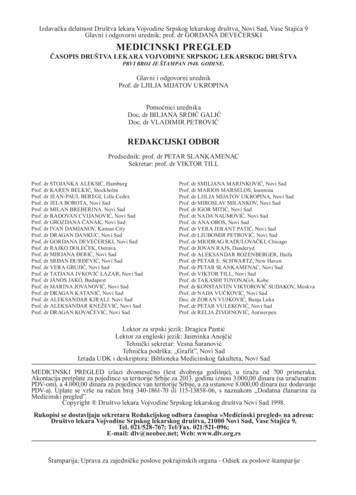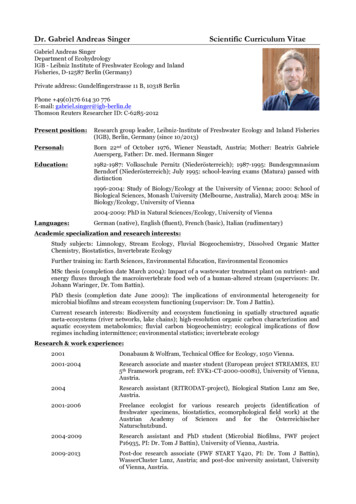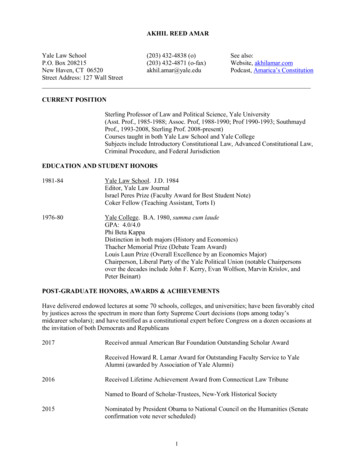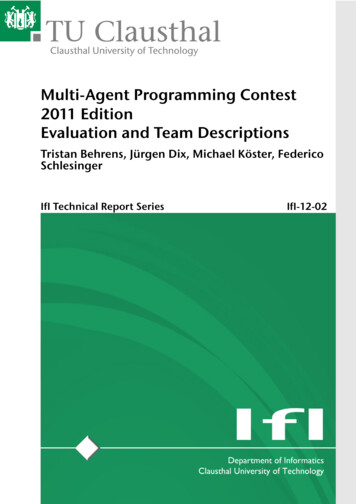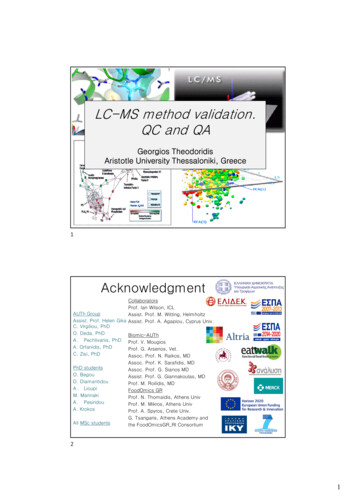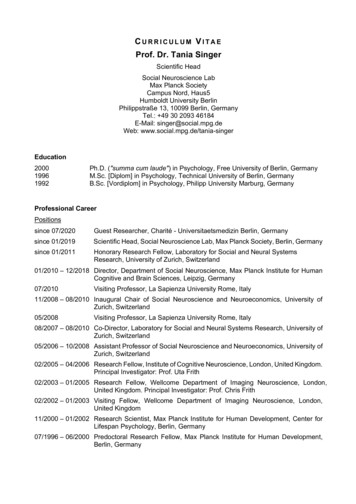
Transcription
CURRICULUM VITAEProf. Dr. Tania SingerScientific HeadSocial Neuroscience LabMax Planck SocietyCampus Nord, Haus5Humboldt University BerlinPhilippstraße 13, 10099 Berlin, GermanyTel.: 49 30 2093 46184E-Mail: singer@social.mpg.deWeb: 2Ph.D. ("summa cum laude") in Psychology, Free University of Berlin, GermanyM.Sc. [Diplom] in Psychology, Technical University of Berlin, GermanyB.Sc. [Vordiplom] in Psychology, Philipp University Marburg, GermanyProfessional CareerPositionssince 07/2020Guest Researcher, Charité - Universitaetsmedizin Berlin, Germanysince 01/2019Scientific Head, Social Neuroscience Lab, Max Planck Society, Berlin, Germanysince 01/2011Honorary Research Fellow, Laboratory for Social and Neural SystemsResearch, University of Zurich, Switzerland01/2010 – 12/2018 Director, Department of Social Neuroscience, Max Planck Institute for HumanCognitive and Brain Sciences, Leipzig, Germany07/2010Visiting Professor, La Sapienza University Rome, Italy11/2008 – 08/2010 Inaugural Chair of Social Neuroscience and Neuroeconomics, University ofZurich, Switzerland05/2008Visiting Professor, La Sapienza University Rome, Italy08/2007 – 08/2010 Co-Director, Laboratory for Social and Neural Systems Research, University ofZurich, Switzerland05/2006 – 10/2008 Assistant Professor of Social Neuroscience and Neuroeconomics, University ofZurich, Switzerland02/2005 – 04/2006 Research Fellow, Institute of Cognitive Neuroscience, London, United Kingdom.Principal Investigator: Prof. Uta Frith02/2003 – 01/2005 Research Fellow, Wellcome Department of Imaging Neuroscience, London,United Kingdom. Principal Investigator: Prof. Chris Frith02/2002 – 01/2003 Visiting Fellow, Wellcome Department of Imaging Neuroscience, London,United Kingdom11/2000 – 01/2002 Research Scientist, Max Planck Institute for Human Development, Center forLifespan Psychology, Berlin, Germany07/1996 – 06/2000 Predoctoral Research Fellow, Max Planck Institute for Human Development,Berlin, Germany
Curriculum Vitae Tania SingerPage 2Offers2009Director, Department of Social Neuroscience, Max Planck Institute for HumanCognitive and Brain Sciences, Leipzig, Germany (accepted)2008Inaugural Chair of Social Neuroscience and Neuroeconomics, University ofZurich, Switzerland (accepted)2008Chair (W3), Cluster of Excellence "Languages of Emotion" at Free UniversityBerlin, Germany (declined)2008Sarlo-Ekman Endowed Chair, University of California, San Francisco, USA(declined)2006Assistant Professor of Social Neuroscience and Neuroeconomics, University ofZurich, Switzerland (accepted)2006Assistant Professor (tenure track), McGovern Institute for Brain Research,Massachusetts Institute of Technology (MIT), Cambridge, MA, USA (declined)2006Assistant Professor (tenure track), Psychology Department, University ofGroningen, the Netherlands (declined)2006Lecturer, School of Psychology, Bangor University, Wales, United Kingdom(declined)2006Lecturer, Department of Psychology, University College London, UnitedKingdom (declined)Grants and Awards2020Grant of Berlin University Alliance (BUA) Pandemic Special Call on researchproject “CovSocial: App-based online-monitoring of social cohesion and mentalhealth during SARS-CoV2-pandemic“, in cooperation with Mazda Adli, SonjaEntringer, Christine Heim, Manuel Voelkle, Elisabeth Binder and FelixBlankenburg, (EUR 100,000)2018Bellagio Center Residency, The Rockefeller Foundation, New York, NY, USA2018Spring 2018 Bogliasco Fellowship, The Bogliasco Foundation, New York, NY,USA2018Tania Singer has been elected by the German ManagerMagazin to be one ofthe 100 most influential women in economy2016Tania Singer has been elected by the German ManagerMagazin to be one ofthe 75 most influential women in economy2015Tania Singer has been elected by the German ManagerMagazin to be one ofthe 50 most influential women in economy2014 – 2018Grant of Bundesministerium für Bildung und Forschung (BMBF), Bonn,Germany, on Research project P4 (“Modulatory effects of oxytocin treatment onhigher-order social cognition in ASD”, Co-PIs Philipp Kanske, Sören Krach,Frieder Paulus) of the ASD-net (“Autism Spectrum Disorder across the lifespan:From a better etiological understanding, through valid diagnosis, to moreeffective health care”; EUR 354,517)2013 – 2017Grant from the Institute for New Economic Thinking (INET) on “From homoeconomicus towards caring economics” together with Prof. Dr. Dennis Snower,New York, NY, USA (EUR 784,440)2010 – 2011Grant from the National Centre of Competence in Research (NCCR) on NeuralPlasticity and Repair, Zurich, Switzerland (CHF 25,000)2009 – 2012Grant from the Foundation for Scientific Research of the University of Zurich,Switzerland (CHF 13,000)
Curriculum Vitae Tania SingerPage 32009 – 2010Grant from the National Centre of Competence in Research (NCCR) on NeuralPlasticity and Repair, Zurich, Switzerland (CHF 75,000)2008 – 2014Starting Grant from the European Research Council (ERC; EUR 1,500,000)2008 – 2010Grant from the Betty and David Koetser Foundation for Brain Research, Zurich,Switzerland (CHF 146,475)2008 – 2010Grant from the Neuroscience Center Zurich (ZNZ), Switzerland (CHF 142,800)2008 – 2011Grant from the Swiss National Science Foundation (SNF; CHF 296,000)2007 – 2011Grant from the National Centre of Competence in Research (NCCR) on NeuralPlasticity and Repair, Zurich, Switzerland (CHF 196,666)2007 – 2010Grant from the National Centre of Competence in Research (NCCR) for theAffective Sciences, Geneva, Switzerland (CHF 140,000)2004Grant for a Novartis Symposium "Empathy and Fairness: Neuronal,Psychological and Developmental Basis" by Singer, Blakemore, Frith, and Frith;held in October, 2005, London, United Kingdom2003 – 2005Grant from the German Academy of Sciences Leopoldina, Halle, Germany2001Otto Hahn Medal of the Max Planck Society for best dissertation of the year2000Board, Fellowships, and Scientific Committee Memberships2020 - presentMember, Interdisciplinary Forum Neurourbanistics, Berlin, Germany2020 – presentAdvisory Board Member, Vivir Agradecidos Foundation, Buenos Aires,Argentina2019 – presentAmbassador Gemeinwohl Ökonomie (GWÖ), Austria2018 – presentHonorary Board Member, Mind & Life Europe, Winterthur, Switzerland2017 – presentFellow, International Positive Psychology Association (IPPA), Melbourne,Australia2015 – erbandAchtsamkeit/Mindfulness (ÖBAM), Hellwang, Austria2014 – presentAdvisory Group Member, European New Economics Research & PolicyNetwork2014 – 2018Board Member, Mind & Life Europe, Winterthur, Switzerland2013 – presentAdvisory Board Member, Human Mind Project, London, United Kingdom2013 – presentMember, Young Academy of Europe (YAE), Europe2012 – 2018Board Member, Mind & Life Institute (MLI), Charlottesville, VA, USA2012 – 2014Member, European Advisory Committee, Mind & Life Europe, Winterthur,Switzerland2011 – 2019Honorary Professor for Social Neurosciences, Faculty of Biosciences,Pharmacy and Biology, University of Leipzig, Germany2011 – 2019Honorary Professor for Social Neuroscience, Psychology Department, Facultyof Life Sciences Humboldt-Universität zu Berlin, Germany2011 – 2018Board & Faculty Member, International Max Planck Research School onNeuroscience of Communication: Function, Structure and its Plasticity (IMPRSNeuroCom), Leipzig, Germanyfür
Curriculum Vitae Tania SingerPage 42011 – 2016Member, European Initiative for Integrative Psychological Science, Associationfor Psychological Science (APS)2010 – 2019Faculty and Scientific Council Member, Berlin School of Mind and Brain2010 – 2011Principal Investigator, Center for Integrative Life Sciences (CILS), Berlin2010 – presentMember, Center for Research in Economics, Management, and the Arts(CREMA), Zurich, Switzerland2009 – presentAdvisory Board Member, Center for Compassion and Altruism Research andEducation (CCARE), Stanford University School of Medicine, Stanford, CA,USA2010 – presentMember & Fellow, Association for Psychological Science (APS)2010 – presentFellow, Mind & Life Institute (MLI), Hadley, MA, USA2006 – presentAssociate Member, Institut Jean Nicod, Paris, France2006 – 2010Associate, Swiss Centre for Affective Sciences, Geneva, SwitzerlandMemberships in Scientific Organizations2013 – 20142012 – present2011 – presentMember, Association for the Scientific Study of Consciousness (ASSC)Member, Social and Affective Neuroscience Society (SANS)Member, Society for Neuroeconomics2011 – present2010 – presentMember, Society for Social Neuroscience (S4SN)Member, Association for Psychological Science (APS)2010 – present2010 – presentMember, German Neuroscience Society (NWG)Member, German Psychological Society (DGPs)2010 – presentMember, Society for Personality and Social Psychology (SPSP)2009 – present2009 – present2009 – presentMember, Organization for Human Brain Mapping (OHBM)Member, Leopoldina Academy Circle of Friends, GermanyMember, Society for Neuroscience (SfN)2009 – 2011Member, International Brain Research Organization (IBRO)2008 – presentMember, The New York Academy of Sciences (NYAS)2007 – presentMember, Cognitive Neuroscience Society (CNS)Editorial ActivitiesJournal Editorial Board & Section Editing2011 – 2017Consulting Editor, Emotion2009Editorial Advisory Board Member, The Year in Cognitive Neuroscience2008Section Editor of the Special Section on Empathy, Emotion 8(6)2008 – 2016Consulting Editor, Social Cognitive and Affective Neuroscience2006 – 2008Associate Editor, Social Cognitive and Affective NeuroscienceAd Hoc Journal ReviewingBrainBrain ResearchCerebral CortexPhilosophical Transactions of the RoyalSocietyCognitive Brain ResearchConsciousness and Cognition
Curriculum Vitae Tania SingerCortexCurrent BiologyCurrent Opinion in NeurobiologyEmotionEuropean Journal of NeuroscienceJournal of Cognitive NeuroscienceJournal of PainNatureNature CommunicationsNature eportPage 5Neuroscience & Biobehavioral ReviewsPhilosophical Transactions of the RoyalSocietyPhysiologyPLoS BiologyPLoS OneProceedings of the National Academy ofSciencePsychological BulletinPsychological ScienceScienceScientific ReportsSocial Cognitive and Affective NeuroscienceSocial NeuroscienceThe Journal of NeuroscienceTrends in Cognitive SciencesOrganization of Symposia, Meetings, and Conferences2019Planning Committee, European Neurophenomenology, Contemplative, and EmbodiedCognition Network (ENCECON) Workshop, Schloss Buchenau, Germany2016Co-Organizer of “Power and care: A Mind & Life dialogue with H.H. the Dalai Lama”,Brussels, Belgium2016Co-Organizer of the workshop “The European neurophenomenology, contemplative, andembodied cognition network (ENCECON)”, Château de la Bourlie, France2016Co-Organizer of the symposium “Frontiers in cognitive neuroscience”, Max Planck Institutefor Human Cognitive and Brain Sciences, Leipzig, Germany2016Co-Organizer of the symposium “Frontiers in computational neuroscience”, Max PlanckInstitute for Human Cognitive and Brain Sciences, Leipzig, Germany2014Organizer of the workshop “Cutting edge research on human development: Learning, socialcognition, action, and emotion", Max Planck Institute for Human Cognitive and BrainSciences, Leipzig, Germany2013Co-Organizer of the “Mind & Life European symposium for contemplative studies”, Berlin,Germany2012Steering Committee Member of the 2012 International Symposia for Contemplative Studies,Denver, CO, USA2011Organizer of the workshop “How to train compassion”, Berlin, Germany2010Co-organizer of the Laboratory for Social and Neural Systems Research OpeningSymposium, University of Zurich, Switzerland2010Co-organizer of the Mind & Life XX Meeting “Altruism and compassion in economicsystems: A dialogue at the interface of economics, neuroscience and contemplativesiences”, Zurich, Switzerland (with H.H. the 14th Dalai Lama)2008Co-organizer of the international symposium “Foundations of human social behavior”,University of Zurich, Switzerland2008Chair of symposium “A common role of anterior insula in feelings, empathy, and risk?”Annual Meeting of the Cognitive Neuroscience Society (CNS), San Francisco, CA2007Chair (with Klaus Scherer) of invited symposium “New trends in affective and socialsciences”, 10th Congress of the Swiss Society of Psychology, “Differences, Diversity, andChange”, Zurich, Switzerland2007Co-organizer of the NCCR Affective Sciences workshop “Empathy and prosocial behavior:Are they linked?”, Geneva, Switzerland, USA
Curriculum Vitae Tania SingerPage 62005Co-organizer of an ICN symposium “Empathy and fairness”, Institute of CognitiveNeuroscience (ICN), London, United Kingdom2005Co-organizer of the Novartis symposium “Empathy and fairness”, London, United KingdomSelected Media CoverageSelected international media (TV and print)ARTE, NBC TV, ABC TV, BBC News 24, BBC World Service, BBC Radio 4 and 5, LondonBroadcast, Financial Times, Huffington Post, La Libre, Le Point, Le Figaro, National Geographic,Neue Züricher Zeitung, New Scientist, San Francisco Chronicle, St. Galler Tagblatt, The Guardian,The New York Times, The Times, Tribune de Genève, Science MagazineGerman print mediaBerliner Zeitung, Die ZEIT, Die WELT, Der Spiegel, Der Tagesspiegel, EMMA, ManagerMagazin,Frankfurter Allgemeine Zeitung, Frankfurter Rundschau, Gehirn und Geist, GEO, Handelsblatt,Leipziger Volkszeitung, Max Planck Journal, Psychologie Heute, National Geographic, SüddeutscheZeitung, Thüringische Landeszeitung, Vogue, WirtschaftsWocheGerman TV Channels and RadioARTE, BR-Alpha, 3sat, MDR, NDR, RBB, SF1, TSR1, ZDFDeutschlandradio, ORF1, rbbKulturOnline mediaFOCUS Online, heute.de, Huffington Post, New Scientist, Project Syndicate, Science Daily,Psychology Today, Tagesspiegel Online, ZEIT OnlinePocastSidewalktalks, Weiter.Denken.Ordnen.Gestalten (AHG), Cuba PlatformTeaching ExperienceJanuary 2020“The Neuroscience of Empathy, Compassion and Prosociality: Lessons from theReSource Project”, Diplôme Universitaire de Médecine Méditation etNeurosciences”, Mont St. Odile, FranceJune 2019“Beyond Mindfulness: A Social Neuroscience Perspective on How to CultivateMind and Heart” Cortona Week Summerschool, Todi, ItalyJanuary 2019“The Neuroscience of Empathy, Compassion and Prosociality: Lessons from theReSource Project”, Diplôme Universitaire de Médecine Méditation etNeurosciences”, Mont St. Odile, FranceJune 2017“Plasticity of the Social Brain: Effects of a One-year Mental Training Study onSocial Connectedness, Compassion, Theory of Mind, Social Stress and the Body”Mind & Life Summer Research Institute Garrison Institute, Garrison, New York,USAFebruary 2017“Lessons from the ReSource Project: Effects of a One-Year Mental Trainingon Brain Plasticity, Compassion, Perspective Taking, Attention, Stress,Interoception and Prosocial Behavior” Oxford Mindfulness Center, Oxford, UKAugust 2015“Lessons from the ReSource Project: How can we get from the cultivation ofconsciousness, brain, and behavior to a more caring society?” EuropeanReSearch Summer School (ESRI), Chiemsee, Germany
Curriculum Vitae Tania SingerPage 7Winter 2014/15 “When socio-affective neurosciences meets decision sciences: The puzzle ofunderstanding and cooperating with others”, Humboldt University and BerlinSchool of Mind and Brain School, Berlin, GermanyWinter 2014/15 Mini-course (graduate level), Department of Economics, University of Zurich,SwitzerlandAugust 2014“Integrating First- and Third-Person Perspective in Contemplative Neuroscience:Examples and Challenges” European Research Summer School (ESRI),Chiemsee, GermanyWinter 2011/12 „Empathie – Wie kann sich der Mensch mental und emotional in anderehineinversetzen?“, Ringvorlesung „Miteinander – Füreinander? Sozialverhaltenvon Menschen und Affen”, Georg August University Göttingen, GermanySpring 2010“Introduction to neuroeconomics and social neuroscience” (undergraduate level),University of Zurich, Switzerl. (with Grit Hein, Susanne Leiberg, Nikolaus Steinbeis)Spring aduateUniversity of Zurich, Switzerland (with Ernst Fehr, Klaas Enno Stephan)Fall 2009“Introduction to Neuroeconomics and Social Neuroscience” (undergraduate level)University of Zurich (with Grit Hein, Susanne Leiberg, Nikolaus Steinbeis)Fall 2009“Social neuroscience” (graduate level), University of Zurich, SwitzerlandFall 2009“Frontiers in social neuroscience and neuroeconomics” (post-graduate level)University of Zurich, Switzerland (with Ernst Fehr, Klaas Enno Stephan)Fall aduatelevel)University of Zurich (with Ernst Fehr, Markus Heinrichs, Klaas Enno Stephan)May 20093rd Cargèse Summer School on Consciousness (“Self-consciousness andConsciousness of others”), Institut d’Etudes Scientifiques de Cargèse, Corsica,FranceSpring 2009“Social neuroscience” (graduate level), University of Zurich, Switzerland (with OlgaKlimecki, Romana Snozzi)Spring 2009“Foundations of human social behavior” (post-graduate level), University of Zurich(with Ernst Fehr, Markus Heinrichs, Klaas Enno Stephan)Fall 2008“Social neuroscience” (graduate level), University of Zurich, SwitzerlandFall 2008“Frontiers in social neuroscience and neuroeconomics” post-graduate level),University of Zurich (with Ernst Fehr, Markus Heinrichs, Klaas Enno Stephan)Fall 2008“Foundations of human social behavior” (post-graduate level), University of Zurich(with Ernst Fehr, Markus Heinrichs, Klaas Enno Stephan)Jun 2008Mind & Life Summer Research Institute, Garrison Institute, Garrison, New York,USASpring 2008“Social neuroscience” (graduate level), University of Zurich, SwitzerlandSpring 2008“Foundations of human social behavior” (post-graduate level), University of Zurich(with Ernst Fehr, Markus Heinrichs, Klaas Enno Stephan)Fall 2007“Social neuroscience” (graduate level), University of Zurich, SwitzerlandFall 2007“Foundations of human social behavior” (post-graduate level), University of Zurich(with Ernst Fehr, Markus Heinrichs)Jul 2007MRC/CSHL Summer Workshop “The biology of social cognition”, St. Anne’sCollege, University of Oxford, United KingdomJul 20075th European Neuro-IT and Neuroengineering School “Cognition & Action”, HanseInstitute for Advanced Study (HWK), Delmenhorst, GermanySpring 2007“Social neuroscience” (graduate level), University of Zurich, Switzerlandlevel)
Curriculum Vitae Tania SingerPage 8Spring 2007“Foundations of human social behavior” (post-graduate level), University of Zurich,Switzerland (with Ernst Fehr, Markus Heinrichs, and Michael Kosfeld)Dec 2006PENS-Hertie Winter School “Brain basis of social interaction: From concepts toimaging”, Kitzbühel, Austria2005 – 2006Organizer of the “Social Club” series, Institute of Cognitive Neuroscience, London,United Kingdom2002 – 2003Organizer of the “Brain meeting” series, Wellcome Department of ImagingNeuroscience, London, United KingdomResearch Interests Social and affective neuroscience (brain plasticity, social decision-making, development ofsocial cognition, psychopathology of the social brain) Neuroeconomics, caring economics and cooperation research Contemplative neuroscience, meditation and mindfulness research Multi-method approach (functional and structural MRI, rt-fMRI, TMS, behavioral methods,hormonal and autonomic measures, game theoretical and neuroeconomic paradigms, subjectivemeasures and phenomenology, virtual reality paradigms)PublicationsBooks8Ricard, M., Singer, T., & Karius, K. (Hgs.) (2019). Die Macht der Fürsorge. Wissenschaft undBuddhismus in Dialog mit dem Dalai Lama. KNAUR.LEBEN.7Ricard, M., Singer, T., & Karius, K. (Hgs.) (2019). Power and care. Toward balance for ourcommon future – Science, society, and spirituality. In dialogue with the Dalai Lama. Boston,MA: MIT Press.6Ricard, M., Singer, T., & Karius, K. (2018). Pouvoir et altruisme. Paris: Allary Éditions.5Singer, T., Kok, B. E., Bornemann, B., Zurborg, S., Bolz, M., & Bochow, C. (2016). TheReSource Project: Background, design, samples, and measurements. Max Planck Institute forHuman Cognitive and Brain Sciences, Leipzig.4Singer, T., & Ricard, M. (Hgs.) (2015). Caring economics: Conversations on altruism andcompassion, between scientists, economists, and the Dalai Lama (pp. 240). New York:Picador.3Singer, T., & Ricard, M. (Hgs.) (2015). Mitgefühl in der Wirtschaft. Ein bahnbrechenderForschungsbericht (pp. 255). München: Knaus.2Singer, T., & Bolz, M. (Hgs.) (2013). Compassion: Bridging practice and science. Retrievedfrom http://www.compassion-training.org. Leipzig: Max Planck Institute for Human Cognitiveand Brain Sciences.1Singer, T., & Bolz, M. (Hgs.) (2013). Mitgefühl: In Alltag und Forschung. Retrieved fromhttp://www.compassion-training.org. Leipzig: Max Planck Institute for Human Cognitive andBrain Sciences.Articles in Refereed Journals127 Tholen, M.G., Trautwein, F.-M., Böckler, A., Kanske, P. & Singer, T. (2020). fMRI item analysisof empathy and theory of mind. HBM, 41(10), 2611-2628. doi: 10.1002/hbm.24966.126 Grosse Wiesmann, C., Friederici, A.D., Steinbeis, N., & Singer, T. (2020). Two differentsystems for thinking about other people’s thoughts in the developing brain. Proceedings of theNational Academy of Sciences, 117(12), 6928-6935.
Curriculum Vitae Tania SingerPage 9125 Trautwein, F., Kanske P., Böckler-Raettig, A. & Singer, T. (2020). Differential Benefits ofMental Training Types for Attention, Compassion, and Theory of Mind. Cognition, 194. doi:10.1016/j.cognition.2019.104039124 Puhlmann, L.M.C., Engert, V., Apostolakou, E., Papassotiriou, I., Chrousos, G. P., Vrtička, P.& Singer, T. (2019). Only vulnerable adults show change in chronic low-grade inflammationafter contemplative mental training: evidence from a randomized clinical trial. ScientificReports, 9(1). 1-12. doi:10.1038/s41598-019-55250-3123 Puhlmann, L.M.C., Valk, S.S., Engert, V., Bernhardt, B.C., Lin, J., Epel, E.S., Vrtička & Singer,T. (2019). Association of Short-Term Change in Telomere Length with Cortical ThicknessChanges and Effects of Mental Training Among Healthy Adults: A randomised clinical trial.JAMA Network Open 2 (9): e199687. doi:10.1001/jamanetworkopen.2019.9687122 Przyrembel, M., Vrticka, P., Engert, V. & Singer, T. (2019). Loving-Kindness-Meditation – AQueen of Hearts? Physio-Phenomenonlogical Investigation on the Variety of experience.Journal of Consciousness Studies, 26(7,8). 95-129.121 Preckel, K., Trautwein, F. M., Paulus, F. M., Kirsch, P., Krach, S., Singer, T., & Kanske, P.(2019). Neural mechanisms of affective matching across faces and scenes. Scientific reports,9(1), 1492.120 Bornemann, B., Kovacs, P., & Singer, T. (2019). Voluntary upregulation of heart rate variabilityis improved by mental contemplative training. Scientific Reports, 9:7860. doi:10.1038/s41598019-44201-7119 Linz, R., Puhlmann, L. M. C., Apostolakou, F., Mantzou, E., Papassotiriou, I., Chrousos, G. P.,. & Singer, T. (2019). Acute psychosocial stress increases serum BDNF levels: anantagonistic relation to cortisol but no group differences after mental training.Neuropsychopharmacology, 1. doi: 10.1038/s41386-019-0391-y118 Singer, T., & Engert, V. (2019). It matters what you practice: Differential training effects onsubjective experience, behavior, brain and body in the ReSource Project. Current Opinion inPsychology, 28, 151–158.117 Banzhaf, C., Hoffmann, F., Kanske, P., Fan, Y., Walter, H., Spengler, S., Schreiter, S., Singer,T. & Bermpohl, F. (2018). Interacting and dissociable effects of alexithymia and depression onempathy. Psychiatry Research, 270, 631–638. doi: 10.1016/j.psychres.2018.10.045.116 Böckler, A., Tusche, A., Schmidt, P., & Singer, T. (2018). Distinct mental trainings differentiallyaffect altruistically motivated, norm motivated, and self-reported prosocial behaviour. ScientificReports, 8:13560. doi: 10.1038/s41598-018-31813-8115 Böckler, A., Tusche, A., & Singer, T. (2018). The structure of human prosociality revisited:Corrigendum and addendum to Böckler, Tusche, and Singer (2016). Social Psychological andPersonality Science, 9(6), 754–759. doi: 10.1177/1948550617722200114 Engen, H. G., Bernhardt, B. C., Skottnik, L., Ricard, M., & Singer, T. (2018). Structural changesin socio-affective networks: Multi-modal MRI findings in long-term meditation practitioners.Neuropsychologia, 116(A), 26–33. doi: 10.1016/j.neuropsychologia.2017.08.024.113 Engen, H., Kanske, P., & Singer, T. (2018). Endogenous emotion generation ability isassociated with the capacity to form multimodal internal representations. Scientific Reports,8:1953. doi: 10.1038/s41598-018-20380-7112 Engert, V., Kok, B., Puhlmann, L., Stalder, T., Kirschbaum, C., Papanastasopoulou, C.,Papassotiriou, I., Pervanidou, P., Chrousos, G. P., & Singer, T. (2018). Exploring themultidimensional complex systems structure of the stress response and its relation to healthand sleep outcomes. Brain, Behavior, and Immunity, 73, 390–402. doi:10.1016/j.bbi.2018.05.023.111 Engert, V., Ragsdale, A., & Singer, T. (2018). Cortisol stress resonance in the laboratory isassociated with inter-couple diurnal cortisol covariation in daily life. Hormones and Behavior,98, 183-190. doi: 10.1016/j.yhbeh.2017.12.018
Curriculum Vitae Tania SingerPage 10110 Grosse Wiesmann, C., Friederici, A. D., Disla, D., Steinbeis, N., & Singer, T. (2018).Longitudinal evidence for 4-year-olds’ but not 2- and 3-year-olds’ false belief-related actionanticipation. Cognitive Development, 46, 58–68. doi: 10.1016/j.cogdev.2017.08.007109 Hildebrandt, L. K., McCall, C., & Singer, T. (2018). Socio-affective versus socio-cognitivemental trainings differentially affect emotion regulation strategies. Emotion. Advance onlinepublication. doi:10.1037/emo0000518108 Linz, R., Singer, T., & Engert, V. (2018). Interactions of momentary thought content andsubjective stress predict cortisol fluctuations in a daily life experience sampling study.Scientific Reports, 8:15462. doi:10.1038/s41598-018-33708-0107 Lumma, A.-L., Valk, S. L., Böckler, A., Vrticka, P., & Singer, T. (2018). Change in emotionalself-concept following socio-cognitive training relates to structural plasticity of the prefrontalcortex. Brain and Behavior, 8(4):e00940. doi:10.1002/brb3.940106 Mendes, N., Steinbeis, N., Bueno-Guerra, N., Call, J., & Singer, T. (2018). Preschool childrenand chimpanzees incur costs to watch punishment of antisocial others. Nature HumanBehaviour, 2, 45-51. doi: 10.1038/s41562-017-0264-5105 Preckel, K., Kanske, P., Singer, T. (2018). On the interaction of social affect and cognition:empathy, compassion and theory of mind. Current Opinion in Behavioral Sciences, 19, 1-6.doi:10.1016/j.cobeha.2017.07.010104 Przyrembel, M., & Singer, T. (2018). Experiencing meditation – Evidence for differential effectsof three contemplative mental practices in micro-phenomenological interviews. Consciousnessand Cognition, 62, 82–101. doi: 10.1016/j.concog.2018.04.004103 Böckler, A., Herrmann, L., Trautwein, F.-M., Holmes, T., & Singer, T. (2017). Know thy selves:Learning to understand oneself increases the ability to understand others. Journal of CognitiveEnhancement, 1(2), 197-209. doi: 10.1007/s41465-017-0023-6102 Böckler, A., Sharifi, M., Kanske, P., Dziobek, I., & Singer, T. (2017). Social decision making innarcissism: Reduced generosity and increased retaliation are driven by alterations inperspective-taking and anger. Personality and Individual Differences, 104, 1-7. doi:10.1016/j.paid.2016.07.020101 Bornemann, B., & Singer, T. (2017). Taking time to feel our body: Steady increases inheartbeat perception accuracy and decreases in alexithymia over 9 months of contemplativemental training. Psychophysiology, 54(3), 469-482. doi 10.1111/psyp.12790100 Chierchia, G., Parianen Lesemann, F. H., Snower, D., Vogel, M., & Singer, T. (2017). Caringcooperators and powerful punishers: Differential effects of induced care and power motivationon different types of economic decision making. Scientific Reports, 7:11068.doi:10.1038/s41598-017-11580-899Engen, H. G., Kanske, P., & Singer, T. (2017). The neural component-process architecture ofendogenously generated emotion. Social Cognitive and Affective Neuroscience, 12(2),197-211. doi: 10.1093/scan/nsw10898Engen, H. G., Smallwood, J., & Singer, T. (2017). Differential impact of task relevance ofemotion on three indices of prioritized processing for facial expressions of fear and anger.Cognition and Emotion, 31(1), 175-184. doi: 10.1080/02699931.2015.108187397Engert, V., Kok, B. E., Papassotiriou, I., Chrousos, G. P., & Singer, T. (2017). Specificreduction in cortisol stress reactivity after social but not attention-based mental training.Science Advances, 3(10): e1700495. doi:10.1126/sciadv.170049596Grosse Wiesmann, C., Friederici, A. D., Singer, T., & Steinbeis, N. (2017). Implicit and explicitfalse belief development in preschool children. Developmental Science, 20(5): e12445.doi:10.1111/desc.1244595Grosse Wiesmann, C., Schreiber, J., Singer, T., Steinbeis, N., & Friederici, A. D. (2017). Whitematter maturation is associated with the emergence of Theory of Mind in early childhood.Nature Communications, 8:14692. doi:10.1038/ncomms14692
Curriculum Vitae Tania SingerPage 1194Hildebrandt, L. K., McCall, C., & Singer, T. (2017). Differential effects of attention-,compassion- and socio-cognitively based mental practices on self-reports of mindfulness andcompassion. Mindfulness, 8(6), 1488-1512. doi: 10.1007/s12671-013-0195-993Kamp-Becker, I., Poustka, L., Bachmann, C., Ehrlich, S., Hoffmann, F., Kanske, P., Kirsch, P.,Krach, S., Paulus, F.M., Rietschel, M., Roepke, S., Roesner, V., Schad-Hansjosten, T.,Singer. T., Stroth, S., Witt, S., & Wermter, AK. (2017). Study protocol of the ASD-Net, theGerman research consortium for the study of Autism Spectrum Disorder across the lifespan:From a better etiological understanding, through valid diagnosis, to more effective health care.BMC Psychiatry, 17:206. doi:10.1186
Prof. Dr. Tania Singer Scientific Head Social Neuroscience Lab Max Planck Society Campus Nord, Haus5 Humboldt University Berlin Philippstraße 13, 10099 Berlin, Germany Tel.: 49 30 2093 46184 . 2015 Tania Singer has been elected by the German ManagerMagazin to be one of


